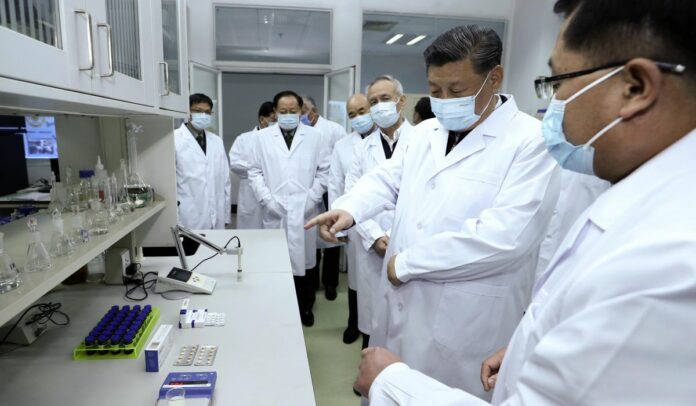China is conducting clandestine biological weapons-related research and has failed to disclose past offensive germ weapons work, according to a State Department report made public Tuesday.
Beijing also is hiding nuclear-related test data by blocking sensors from an international monitoring system used to detect underground nuclear blasts, the annual arms control compliance report contended.
The unclassified report provides new details regarding U.S. concerns “for many years” related to Beijing’s biological weapons research that is not permitted under the 1972 Biological Weapons Convention signed by 183 nations, including China and the United States.
The Biological Weapons Convention bans the development, testing and use of biological arms and requires dismantling all past germ weapons.
“The United States has compliance concerns with respect to Chinese military medical institutions’ toxin research and development because of the potential dual-use applications and their potential as a biological threat,” the report said.
The U.S. government approached China about its concerns and will continue to monitor Chinese biological activities, the report said. “In addition, the United States does not have sufficient information to determine whether China eliminated its assessed biological warfare (BW) program, as required under Article II of the Convention.”
Article I bans all work on biological weapons, and Article II requires elimination of all germ weapons programs.
The report stated that China’s submissions to the convention “have neither documented that offensive program, nor documented that China has eliminated the program or any remaining biological weapons” required under the accord.
The unclassified report stopped short of revealing details about Chinese military research and development on biological weapons but said China has continued building biotechnology infrastructure and working with unspecified “countries of concern.”
A senior U.S. official said the report language was carefully crafted but refers to covert biological weapons research.
Biological weapons include viruses and toxins that can be used in wartime to kill or disable. Among the known biological weapons are anthrax, botulism, tularemia, Ebola, plague and smallpox.
The Washington Times quoted a senior Trump administration official in May alleging that China is engaged in a covert biological weapons program that includes building arms capable of attacking ethnic groups with pathogens.
“We are looking at potential biological experiments on ethnic minorities,” the official said on the condition of anonymity.
A retired Chinese general, Zhang Shibo, stated in a 2017 book, “New Highland of War,” that biotechnology advances were increasing the likelihood of offensive bioweapons, including the danger of “specific ethnic genetic attacks.” A report by the Chinese military’s National Defense University in 2017 included a section warning that biology is a new domain of warfare and that a future germ conflict could include “specific ethnic genetic attacks.”
COVID questions
China’s extensive work with viruses, including laboratory research on bat coronaviruses, has fueled concern that the virus that causes COVID-19 may have escaped from a laboratory in Wuhan.
A senior People’s Liberation Army officer, Maj. Gen. Chen Wei, who is considered an expert in China’s biological defense programs, was dispatched to Wuhan at the end of January, fueling suspicions about the origin of the virus.
The Chinese government has denied that the coronavirus escaped from a laboratory.
Army Gen. Mark A. Milley, chairman of the Joint Chiefs of Staff, said this year that U.S. intelligence agencies were investigating whether the virus escaped from a Wuhan lab or originated naturally. U.S. officials have not linked the coronavirus outbreak to China’s suspected biological weapons programs.
The State Department, however, noted in March that the emergence of the COVID-19 outbreak on the 45th anniversary of the biological weapons treaty only “highlights the importance of [Biological Weapons Convention signatories’] commitments to reducing all biological risks.”
U.S. officials have said China’s secretive behavior regarding the origins of the coronavirus outbreak mirrors the secrecy surrounding its earlier biological weapons research. China possessed an offensive biological weapons program in 1984 when it signed the convention and has not provided proof that the program and weapons were dismantled.
On China’s nuclear testing, the report said China does not appear to be adhering to the “zero yield” moratorium on nuclear testing agreed to in 1996 by signatories of the Comprehensive Nuclear-Test-Ban Treaty. China engaged in a high level of activity at its Lop Nur nuclear testing site last year that experts said appears to be preparation for operating the facility year-round. The activities include the use of explosive containment chambers, extensive excavation and secrecy surrounding its nuclear tests.
Beijing has frequently blocked the flow of data from International Monitoring System stations in China. The stations transmit data to an international center that monitors the test ban treaty.
The data was cut off for more than a year and resumed in August.
“While there are other, more plausible explanations for China’s withholding information from IMS stations, the United States cannot rule out the possibility that China could have conducted activities at its test site that are inconsistent with its moratorium commitment, as interpreted in accordance with the U.S. ‘zero-yield’ standard,” the report said.
China is engaged in a large-scale nuclear forces buildup that includes the addition of multi-warhead missiles, which likely requires new warheads.
The report also faulted Beijing for failing to adhere to guidelines on missile sales under the 35-nation Missile Technology Control Regime.
China “continued to supply MTCR-controlled items to missile programs of proliferation concern,” the report said.






